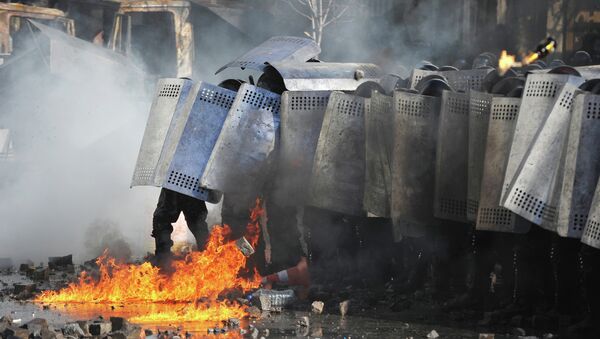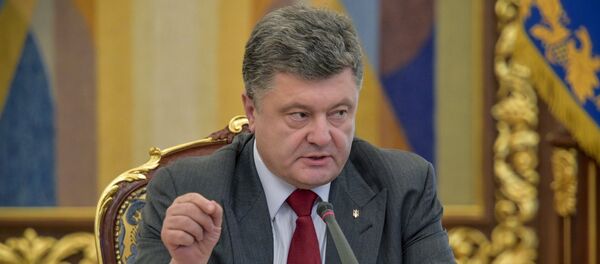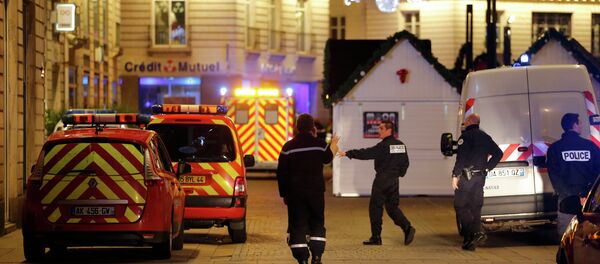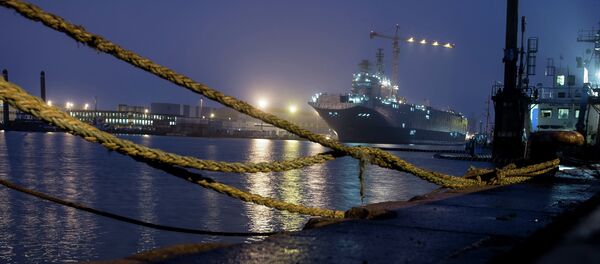MOSCOW, December 30 (Sputnik), Daria Chernyshova — Sputnik summarizes some of the most important political events of 2014, a year that has seen the fall of old dictatorships, the rise of social media as a political force and democracy turned on its head.
Crisis in Ukraine
The crisis in Ukraine has stretched through the year. Tensions within the country have echoed throughout the world and have had international repercussions.
The tragic events that plunged Ukraine into crisis have shaken the geopolitical stability of the world.
Massive anti-government protests began in 2013 in Kiev, with protests erupting against then-Ukrainian President Viktor Yanukovich for his refusal to sign an association deal and trade agreement with the European Union.
In late February Yanukovych, the legitimately elected president of Ukraine, was ousted and Kiev fell victim to a new form of leadership that elected itself by means of a coup.
Protests centering in the southeastern Donbas region saw local residents refusing to recognize the coup-imposed authority and demanding autonomy.
In response, Kiev ordered its military to suppress the protests, which has plunged the region into a protracted violent conflict leading to the current desperate humanitarian situation.
Since the February coup, Ukraine has seen a surge in the popularity of a local form of neo-Nazi ideology. On May 2, rival protests broke out in the southern port city of Odessa both supporting and condemning Kiev. Pro-Kiev protesters, including the Right Sector militia, allegedly blocked the anti-government protesters in the House of Trade Unions. The building was set on fire. According to official data, the tragedy claimed 48 lives and injured over 200. Locals, however, have accused Kiev of covering up the actual death toll, said to be as high as 116.
In a June meeting in Normandy, Ukraine"s newly elected President Petro Poroshenko, Russia"s Vladimir Putin, German Chancellor Angela Merkel and France"s Francois Hollande began a formal diplomatic conversation to reduce tensions in the region. The "Normandy format" talks continued in October in the Italian city of Milan and in numerous phone conversations between the leaders.
The Minsk Accords, reached in the fall, seen as the most comprehensive attempt to settle the crisis in Ukraine. On September 5 and 19, the Contact Group on Ukraine including representatives of Russia, the Kiev government, the self-proclaimed people's republics of Donetsk and Luhansk (DPR, LPR respectively) and the Organization for Security and Co-operation in Europe (OSCE), met in Minsk, the capital of Belarus. The talks resulted in a ceasefire agreement between the DPR, LPR and the Kiev government.
Despite the truce, the DPR and the LPR have accused Kiev forces of violating the Minsk agreement many times. In turn, Kiev has accused both breakaway republics of doing the same. Currently, negotiations are ongoing. As the fighting continues, Russia sends regular convoys of humanitarian aid to the war-torn regions.
Crimea rejoins Russia
Following the February coup in Kiev, the Republic of Crimea conducted a March 16 referendum on its status as an independent entity. An overwhelming 96 percent majority of voters supported reunification with Russia. On March 21, Russian President Vladimir Putin signed a decree on the ratification of a treaty adding Crimea and the city of Sevastopol as the 84th and the 85th federal subjects of the Russian Federation.
The Crimean Republic"s move angered many Western countries, including the United States, the European Union and their allies. Russia, mistakenly thought to be an instigator in what was said to be a forced referendum, was accused of violating international law. The Western allies quickly imposed sanctions against various Crimean and Russian public figures, as well as international restrictions to Russian energy, banking and defense. The sanctions were subsequently increased to include entire sections of the Russian economy, which exacerbated currency stability and created the climate for an economic downturn.
The legitimacy of the Crimean referendum, unrecognized by Kiev and the West, is preventing an easing of the sanctions. Western leaders, steeped in centuries of democratic rhetoric, continue to curiously regard Crimea"s independent vote for reunification with Russia as an annexation.
US-led coalition counters Islamic State offensive in Iraq
In September, Washington created a coalition of over 60 countries and international organizations to counter the rapid rise of the Islamic State (IS) terrorist group in Iraq. The coalition is currently performing airstrikes in Syria and Iraq to eliminate IS and other extremist groups. According to the US State Department, coalition members provide personnel, arms, equipment, training, and other logistical support.
Russia repeatedly pointed out the double standards practiced by the United States and the West in assessing the terrorism threat in Iraq and in Syria. "Of course it becomes particularly bizarre when you have countries condemning some terrorist organizations in Iraq and also looking the other way on the same terrorist organizations in Syria," Russia"s UN envoy Vitaly Churkin said in December. "Even though everyone knows that they have connections to each other, they conduct same terrorist operations."
During the summer, the IS declared a caliphate on territories it captured across eastern Syria, Northern and Western Iraq. Over the past year the extremist militant group has performed numerous and well-documented human rights atrocities, including public crucifixions and beheadings.
Mistral Saga
Tensions between Russia and the West have repercussions that include contract fulfillment, particularly in the delivery of two French Mistral-class helicopter carriers to the Russian Navy. Under pressure from the United States and NATO, Paris did not transfer the first ship, the Vladivostok, to Moscow on November 14.
"This contract was signed during the previous government in 2011. According to international laws, a signed and prepaid contract has to be fulfilled," Fabius said.
However, on November 25, French President Francois Hollande indefinitely postponed delivery of the first ship to Russia, citing ongoing unrest in eastern Ukraine. Russia has condemned France"s failure to deliver on its contractual obligations, saying Paris would pay a large penalty for its cancellation.
OPEC leaves crude output unchange
As world oil prices have declined amid sluggish economic growth and a global oil glut, OPEC chose to continue pumping oil at existing levels. Originally predicted to decrease output in an effort to shore up worldwide oil prices, the Organization of the Petroleum Exporting Countries (OPEC), whose 12 member states account for some 40 percent of world oil output, took the exact opposite direction during a November 27 meeting in Vienna. The announcement triggered a further decline in global crude prices, especially affecting the economies of those countries relying heavily on oil-export, including Russia and Venezuela.
Speaking at his annual press conference in late December, Russian President Vladimir Putin did not rule out the possibility that oil price declines are due to a "collusion between Saudi Arabia and the United States to punish Iran, or to influence the Russian economy and Venezuela."
However, Putin stressed that he expected prices to return to previous levels. Oil prices, dropping from $114 to below $60 per barrel, and economic sanctions have caused the ruble to lose approximately 40 percent of its value against the euro and the dollar in 2014.
South Stream Pipeline
In December Russia called off construction of the South Stream gas pipeline, originally intended to transport Russian gas to Europe through the Black Sea, amid pressure from the European Commission.
Speaking in Istanbul on December 1, Vladimir Putin explained that the European Commission insisted the pipeline would violate the EU Third Energy Package, a stance the Russian president considered non-constructive. Russia immediately began researching other options.
Russia and Turkey have agreed to create an alternative gas pipeline to Turkey. The new pipeline, with an annual capacity of 63 billion cubic meters, will provide 14 billion cubic meters annually to Turkey. The remainder will redirect at a Turkish-Greece border hub for redistribution to southern European countries.
Global Trends on independence referendums
Catalonia, Veneto and Scotland held referendums on independence and self-determination in 2014.
On September 18, Scotland held a referendum to secede from the United Kingdom. The move was rejected by over 55 percent of Scots.
In an unofficial ballot in March, over 89 percent of residents in Veneto, including the city of Venice, expressed their desire to break away from Italy.
Referendums on independence were also held in the self-proclaimed People"s Republics of Donetsk (DPR) and Luhansk (LPR). In both territories, over 90 percent of the residents backed the motion.
GOP takes over US Congress
On November 4, the US Republican Party won 54 of the American Senate"s 100 seats in the 2014 mid-term election. This win is projected to limit policy implementation by the current administration of US President Barack Obama. Election results were widely anticipated and demonstrated American voters" dissatisfaction with the current administration in Washington. By securing a majority in the Senate, the Republicans enjoy de-facto control over the entire legislative branch of the United States.
"They [Republicans] will have significant leverage over the President's appointments and policies, and they will be able to investigate issues as well. I would not minimize their power," Thomas Schwarz, a Vanderbilt professor of history and political science, told Sputnik in November.
The midterm elections, along with numerous opinion polls, showed that the US population is widely disenchanted with the two-term president and strongly disapprove of his handling of a wide array of domestic and foreign policy issues.
Palestinian Statehood issue goes to UNSC
After decades of seeking international recognition, the Palestinian Authority is closer to its goal than ever. Currently, the United Kingdom, Ireland, Sweden, Spain and France have granted the Palestinian Authority status as an observer state and sovereign entity with the right to control the affairs of its own people.
The United Nations Security Council is expected to vote on a draft resolution, submitted on December 17, for the creation of a Palestinian State. The document sets a 12 month deadline following approval for Israeli forces to withdraw from occupied Palestinian territory. On December 17, the European Parliament backed the recognition of the Palestinian Authority as a state.
The Palestinian Authority demands the reclamation of territory occupied by Israel during the 1967 Six-Day War, including the West Bank, East Jerusalem and the Gaza Strip. However, Hamas, which currently controls Gaza, rejected the resolution, claiming that the issue has not been properly discussed among Palestinian factions.
Eurosceptics gain momentum in European parliament
On May 25 over 500 million European Union residents participated in the election of the bloc"s parliament. European Union "Eurosceptic" parties, many described as xenophobic, anti-immigration and even anti-EU, gained significant momentum.
Dissatisfaction over a weak European economy and the attendant austerity measures led European voters to cast ballots for right-wing and Eurosceptic parties in France (Front National), Denmark (Danish People"s Party), Hungary (Jobbik), Austria (Freedom Party), Finland (Finns), the Netherlands (Party For Freedom), Italy (Lega Nord), Britain (UKIP), Greece (Golden Dawn), Germany (National Democratic Party).
Modi takes office in India
Narendra Modi became India"s prime minister on May 26, following the landslide victory of his right-wing Hindu nationalist Bharatiya Janata Party (BJP) in national elections. Modi is expected to bring about long-awaited economic reforms to India, and is under pressure to find jobs for the one million people who enter India"s workforce monthly.
The new Indian prime minister said he would end gender discrimination in the country and promote equality among all citizens. He also demanded an end to female feticide (destruction or abortion of a fetus because it is female) in India.
Modi was chosen 2014 Person of the Year in Time magazine"s reader poll.
Israel's operation in Gaza followed by an open-ended truce
The tensions in the Israeli-Palestinian conflict escalated in June after Israel blamed the deaths of three Israeli schoolboys on Hamas, the high-profile Palestinian Islamic organization and the de facto authority in Gaza. On July 7, in response to the killing, Israel launched Operation Protective Edge against Hamas' military infrastructure in Gaza. During a 50 day military attack that included airstrikes, 2,100 Palestinians and 72 Israelis lost their lives.
On August 26, the Palestinian Authority and Israel, with the mediation of the Egyptian government, agreed to an open-ended truce.
BRICS establish own financial institutions
The sixth annual summit of the BRICS group, comprising Brazil, Russia, India, China and South Africa, has seen the world"s largest developing economies sign off on the establishment of the New Development Bank (NDB) and the Contingency Reserve Agreement (CRA). The move is intended to create a much needed alternative to Western-oriented international financial institutions.
The July BRICS summit in Brazil"s Fortaleza was a stepping stone toward establishing formal ties among the five emerging economies. NDP and CRA will help countries borrow funds for power stations, ports, roads, telecommunication systems and other key infrastructure projects.






